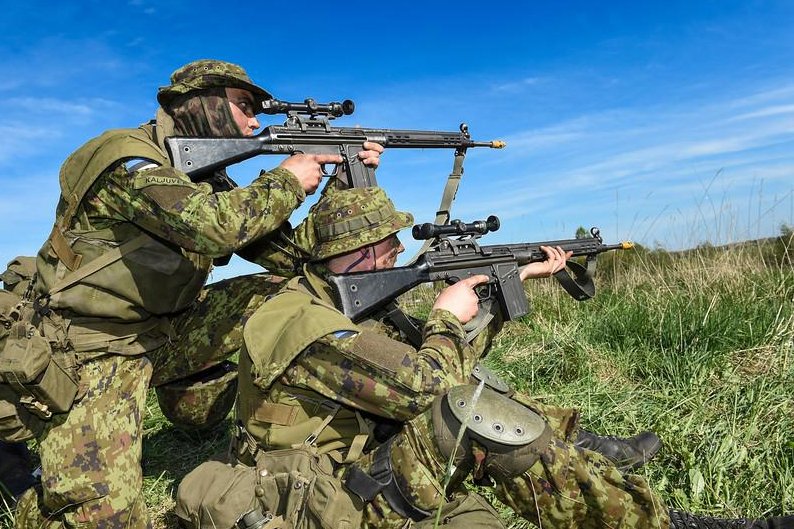Estonian troops during NATO exercise earlier this year. (U.S. Air Force photo/Staff Sgt. Andrew Davis)
BRUSSELS, Sept. 8 (UPI) -- NATO leaders are aiming to strengthen alliance capabilities amid Russian aggression in the Ukraine and growing threats elsewhere that threaten Europe.
First, leaders of the 28 member countries meeting in Wales last week resolved to maintain a continuous air, land, and sea presence in Eastern Europe -- including the Baltics -- on a rotational basis given Russian machinations in the region.
They also agreed to create a rapid response force.
"This spearhead will include several thousand land troops ready to deploy within a few days with air, sea and Special Forces support," said NATO Secretary General Anders Fogh Rasmussen.
The force plan includes a command-and-control presence, reception facilities and pre-positioned equipment.
"This is a demonstration of our solidarity and resolve," Fogh Rasmussen said. "In these turbulent times, NATO must be prepared to undertake the full range of missions and to defend allies against the full range of threats."
The demonstration of resolve comes amid months of tension in Europe over Russia's annexation of Ukraine's Crimea region and action by pro-Russian insurrectionists -- reportedly with active Russian involvement -- to take other parts of the Ukraine, which was once part of the Soviet empire.
The belligerence from Russian President Vladimir Putin in response to European and American protests -- and actions such as sanctions against Russia -- has done nothing to dampen fears of a return to Cold War footing, not to mention fears for the future of territorial integrity in Baltic countries.
Canada, Germany, Portugal, Britain and others perform rotational air patrols in the region as a message to Moscow.
NATO leaders also agreed to put their money where their mouth is by reversing years of declining defense spending by member states.
NATO said the allies will focus their military budgets over the next 10 years to meet the "existing NATO guideline of spending 2 percent of gross domestic product on defense and with a view to meeting NATO capability priorities."
"The security of our countries and citizens is too important for us to cut corners, or to cut still more funds and without security we can have no prosperity," Fogh Rasmussen said.
Whether or not countries -- i.e. their voters -- will spend more for defense is an open question. The United States has decried for years the shrinking defense budgets of its European allies but to no avail.
Only the United States, Britain, Greece and Estonia spent 2 percent or more of their GDP on Defense in 2013, according to NATO figures. Germany and the Netherlands each spent about 1.3 percent.















